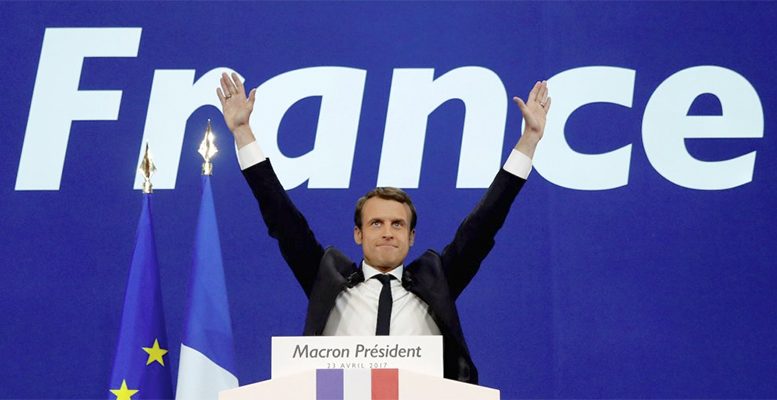This is how centrist candidate Emmanuel Macron celebrated his victory over right-wing candidate Marine Le Pen in yesterday’s French general election, winning 23.9% of vote versus her 21.4%. These results practically guarantee his being elected as the country’s new President in the second round in two weeks time.
Of course until the second round of elections is held there is always some risk of National Front leader Le Pen being victorious. But Link Securities analysts believe there are three factors which make this possibility a very remote one, except if something unexpected happens in the next two weeks.
“In the first place, unlike the UK referendum on Brexit and the US presidential elections, the polls have been right on this time and the final results were perfectly in line, predicting an easy victory for Macron over Le Pen in the second round; secondly, Le Pen has lost momentum as the campaign advanced, given that she started off with voting intention close to 26% and in the first round this not exceeded 22%; and, lastly, the candidates from the two majority parties in France, the Republicans and the Socialist Party, Fillon and Hamon respectively, announced their support for Macron after accepting their defeat.”
The polls, judging by what the other candidates obtained, indicate that Macron will become the 25th president of the Republic with 62% of vote versus 38%.
After the results of the French elections, Exane BNP Paribas analysts expect a relative performance from the European markets with respect to the US market of +5% versus +8%, as well as a “relaxing” of France’s risk premium to pre-election levels in the US of 30 basis points, versus 68 basis points on Friday.
But Carax- Alphavalue flags that despite that increase, the absolute return on French long debt at 0.93% hardly suggests real fear and has actually been edging down since mid-March, like in the US, Italy or Spain. They highlight three other factors which support this theory:
“In the first place, the French banking sector did not decline significantly while the pro-Frexit parties were winning votes in the latest polls. Secondly, volatility was much lower than in 2016, despite the uptick in the last month of +80.76%. And finally, in relative terms we can see the French market (PE for 2017) is on a par with the European average.”
The euro was the fastest to react to Sunday’s results, reaching the reference level of 1.09 vs the US dollar.
FT’s John Authers says:
“For the immediate future, it is reasonable to hope that the euro will stay strong, and that this could help a budding rotation into European stocks.”
French stocks are surging ahead of the rest in Europe this morning, while the European financial sector is enjoying its best day of trading in more than a year.
Emmanuel Macron is a centrist reformer and pro-European. His economic programme is focused mainly on improving the economy’s productivity via a lasting reduction in social charges, cutting the public deficit, driving growth and boosting entrepreneurship through a favourable fiscal policy. Fidelity researchers believe these measures should foreseeably have a positive impact on the outlook for the French economy, as well as on consumer and business confidence.
All analysts agree that the positive scenario after yesterday’s victory by Macron depends on him winning the second round. And obtaining a stable majority in the legislative elections.





